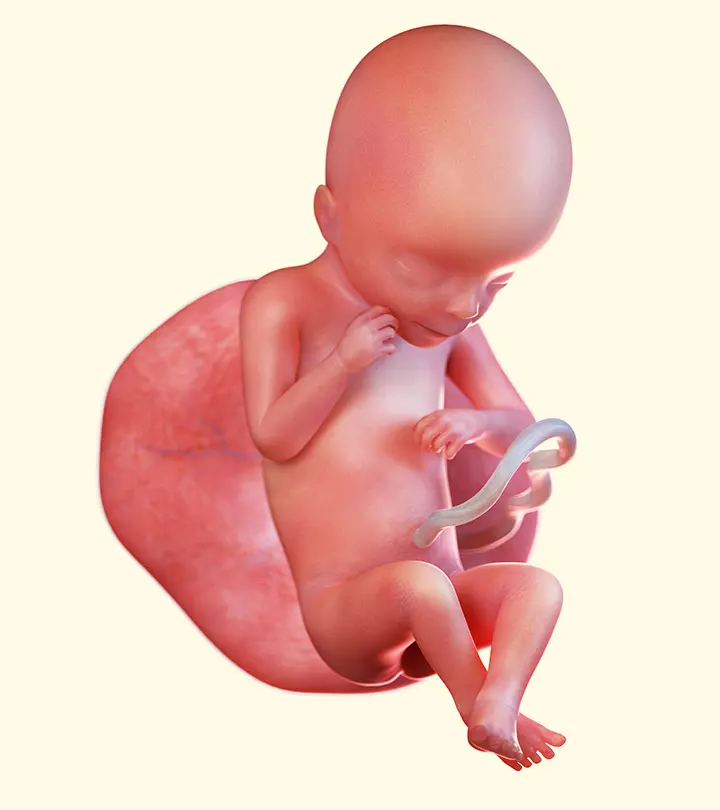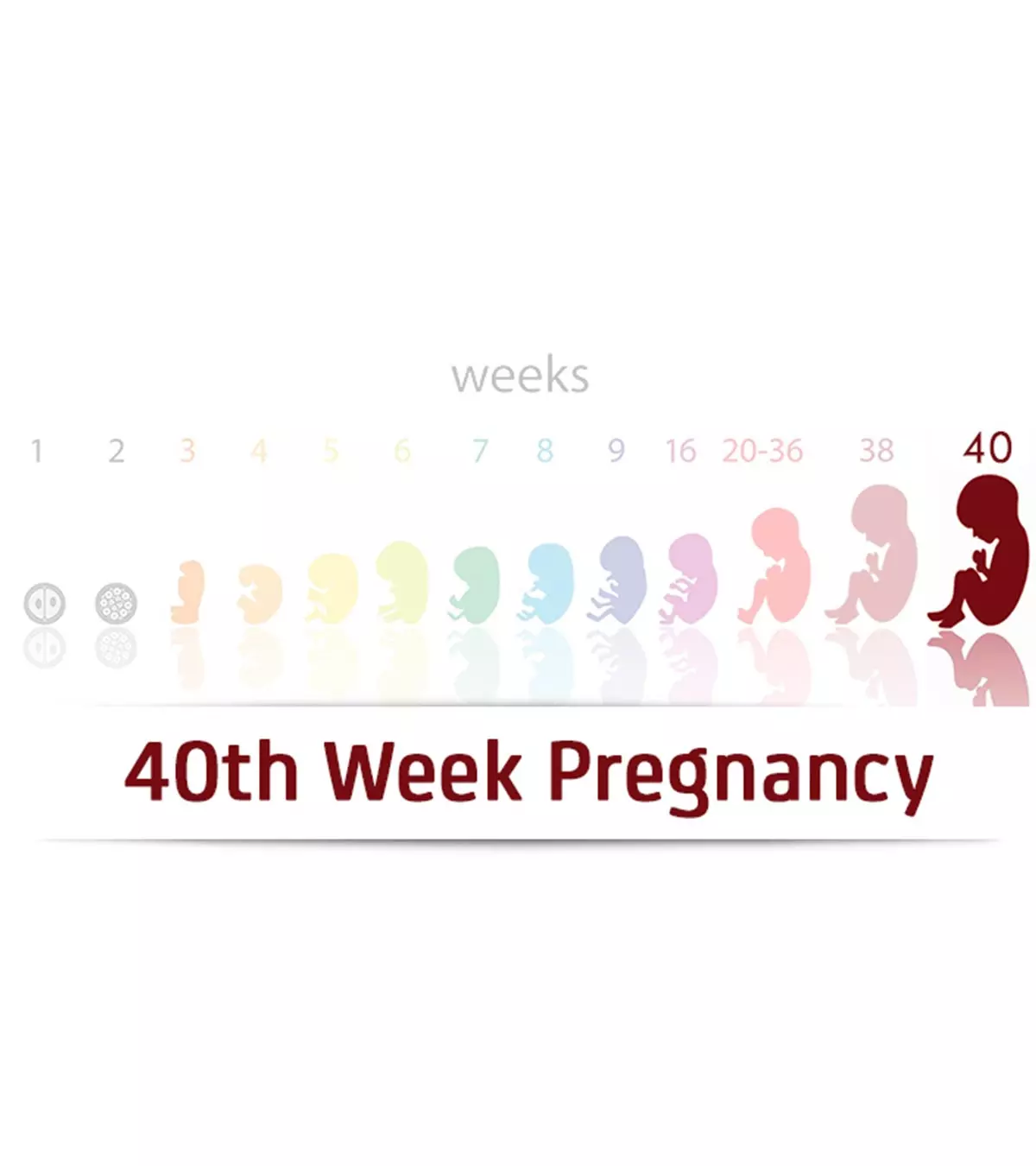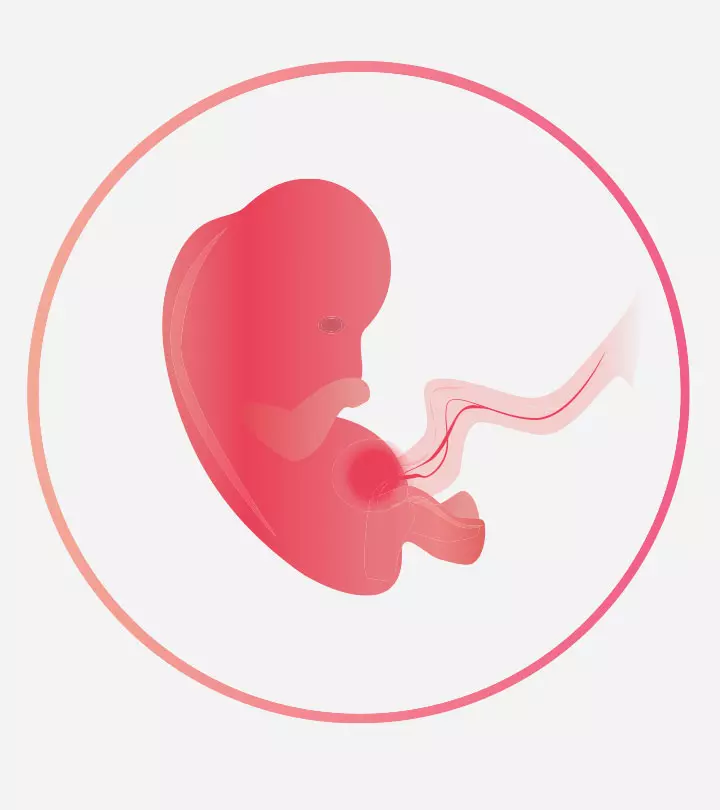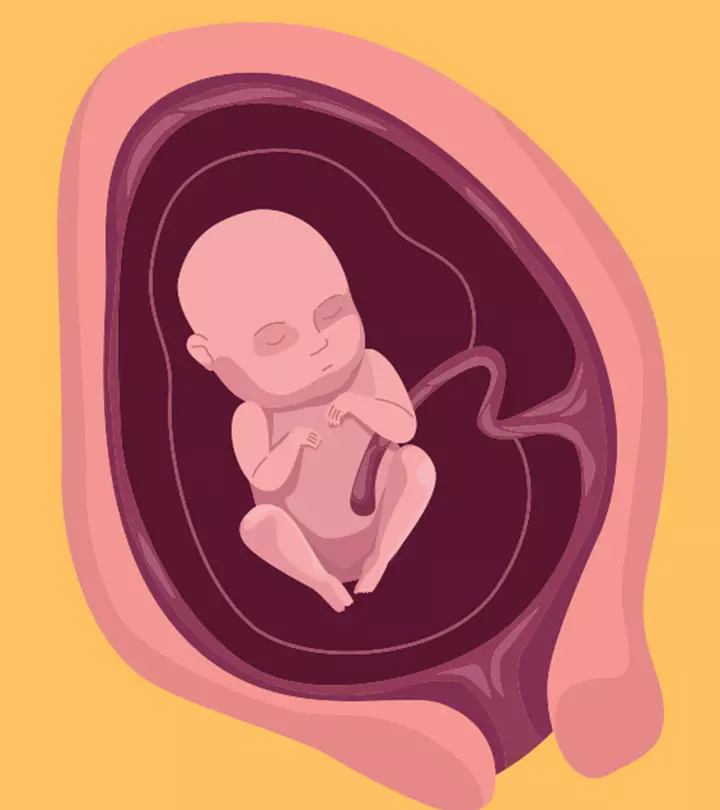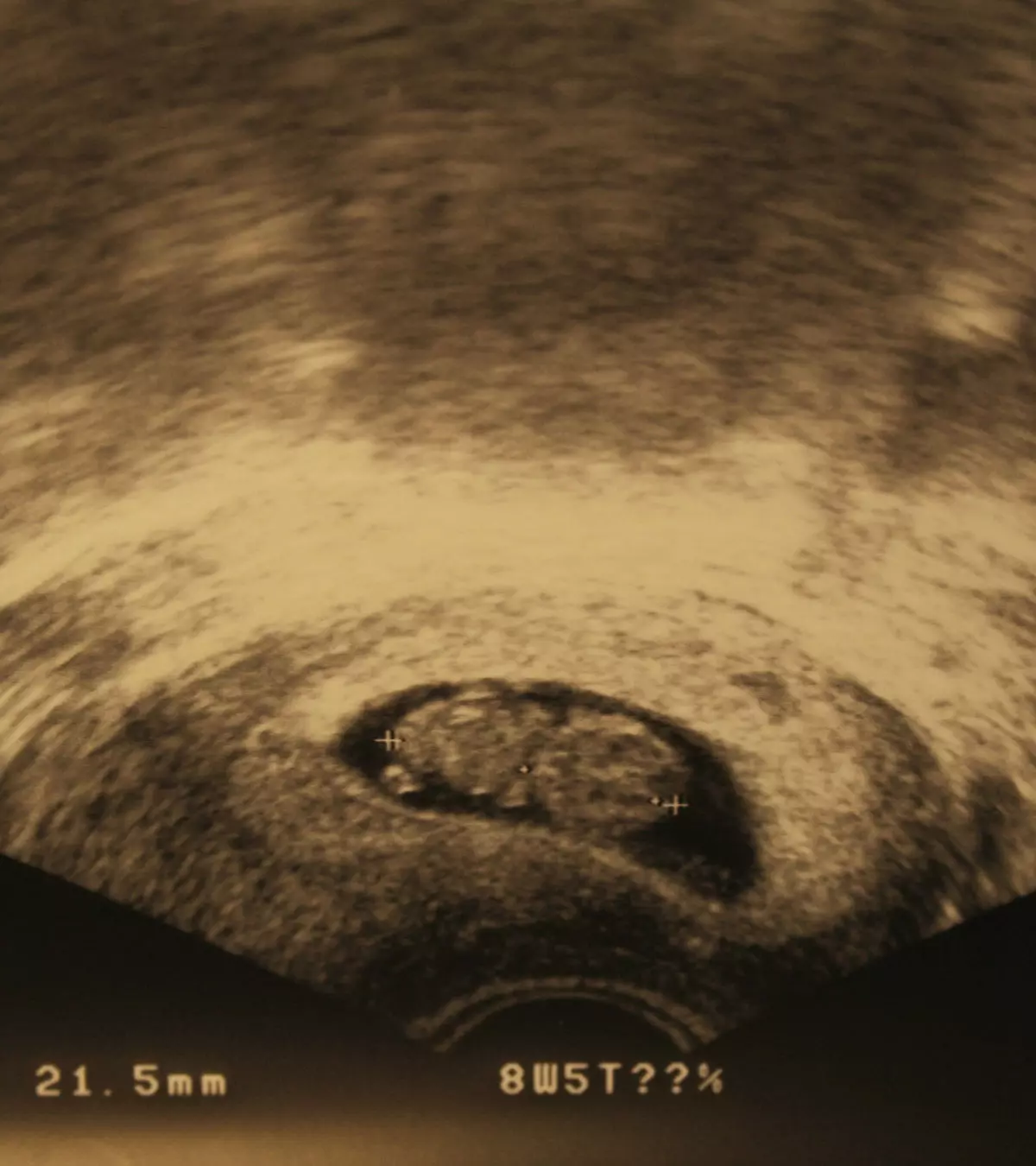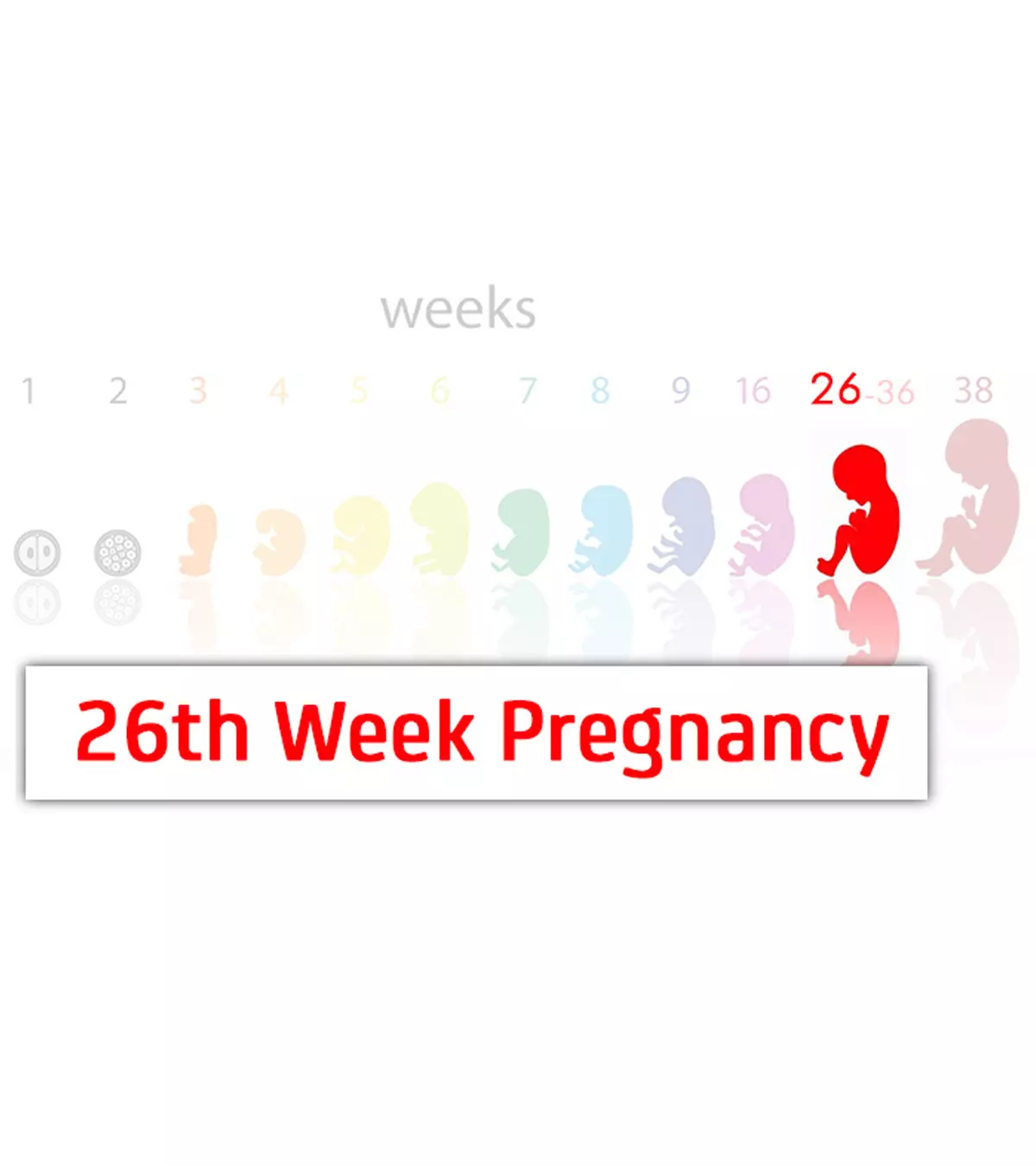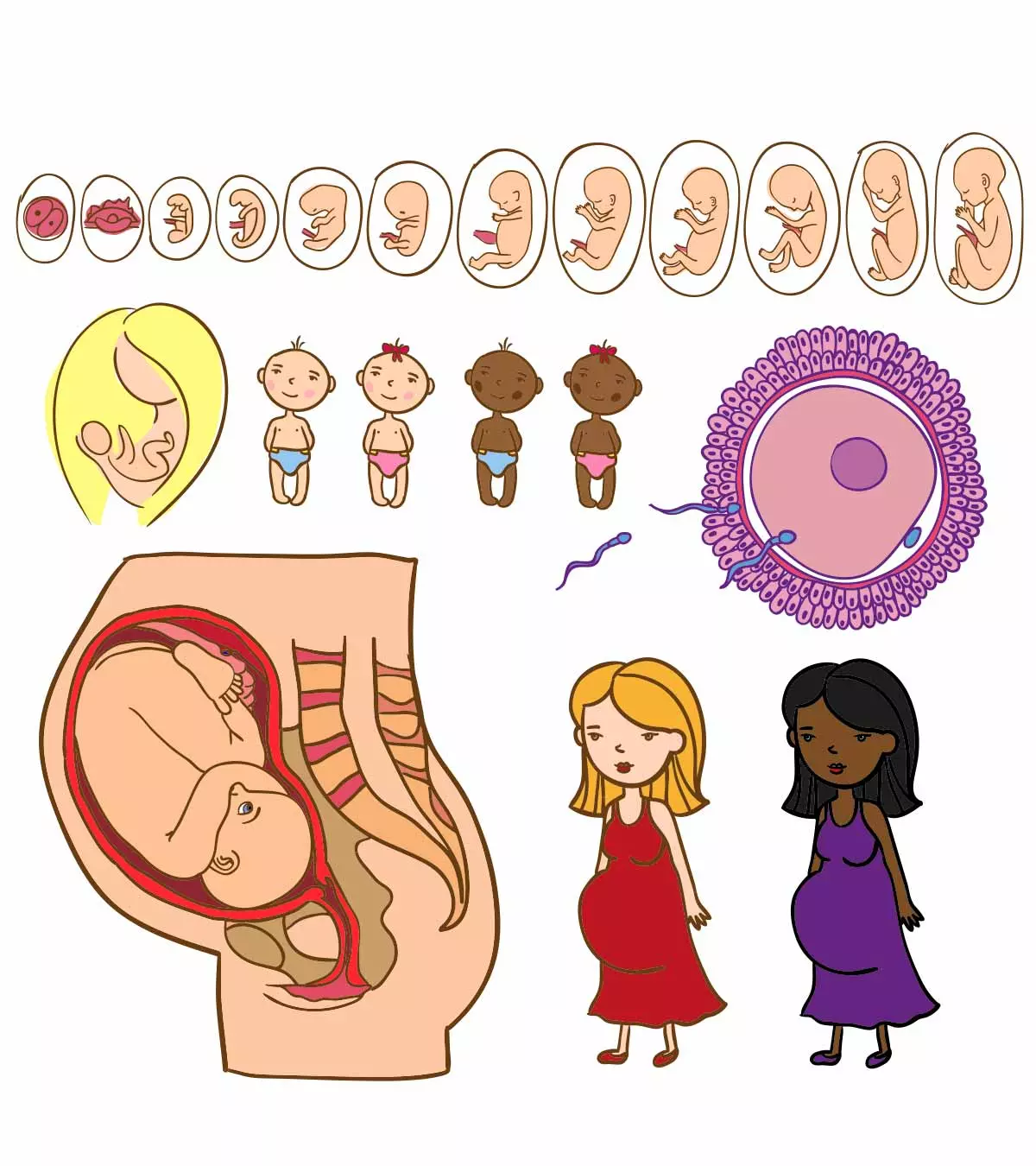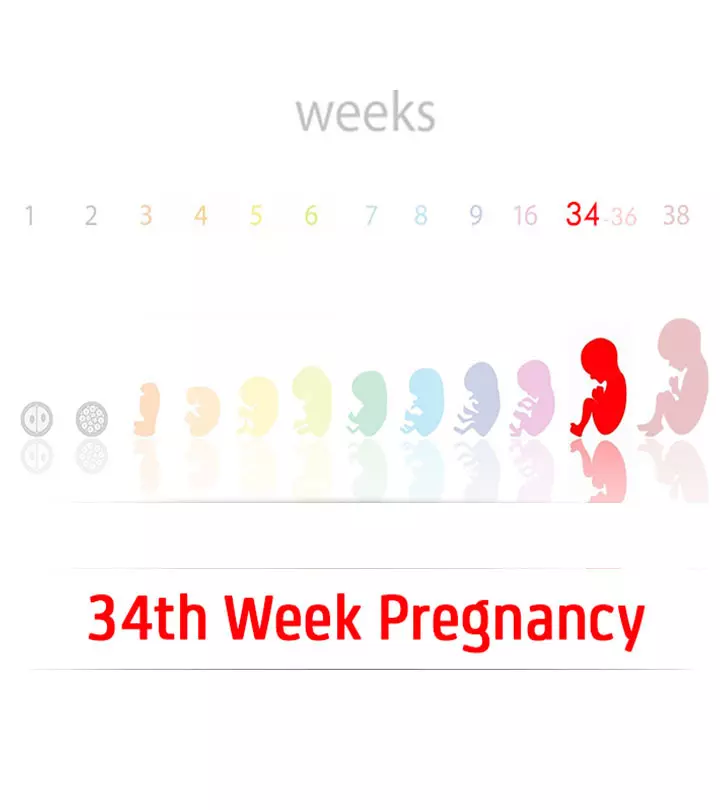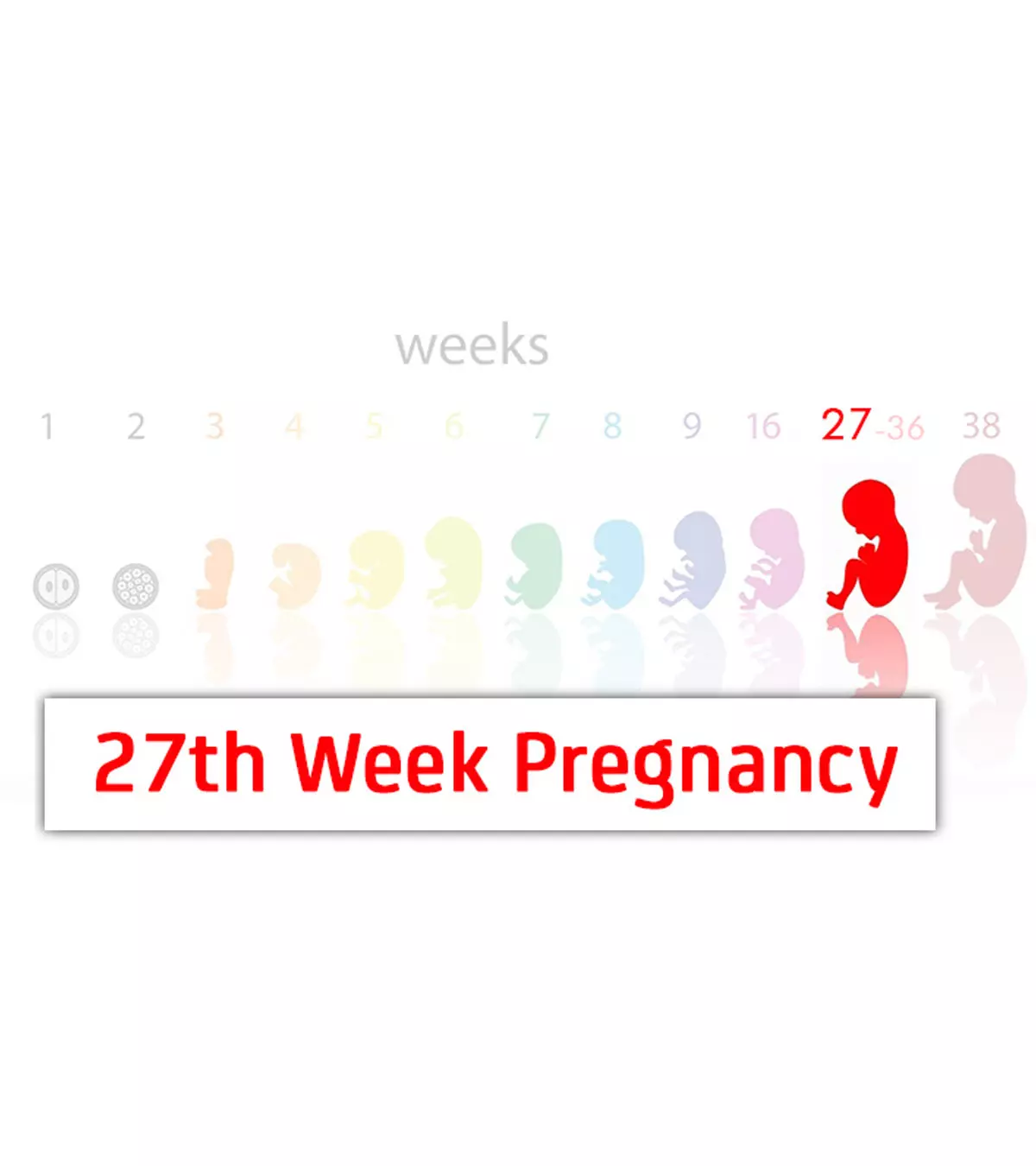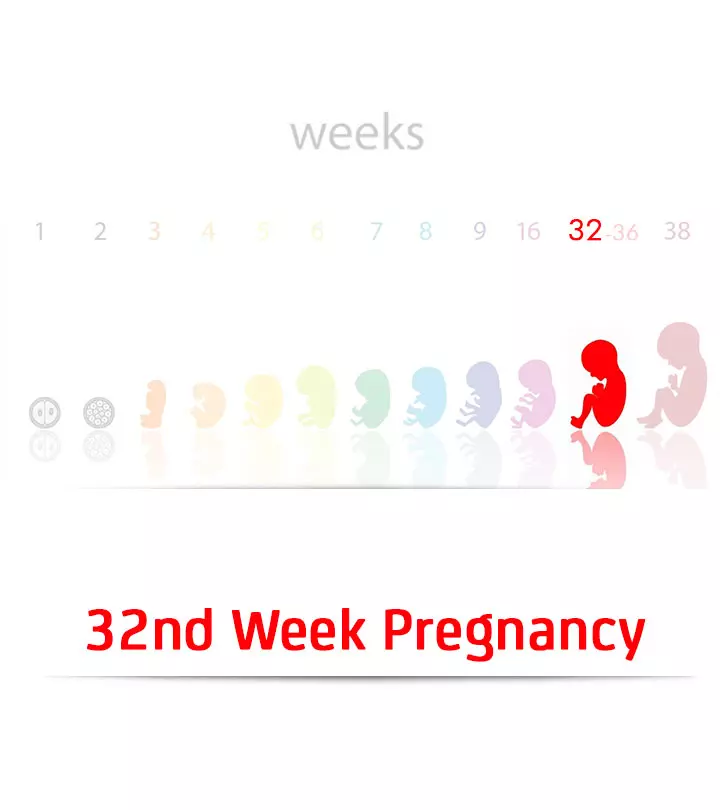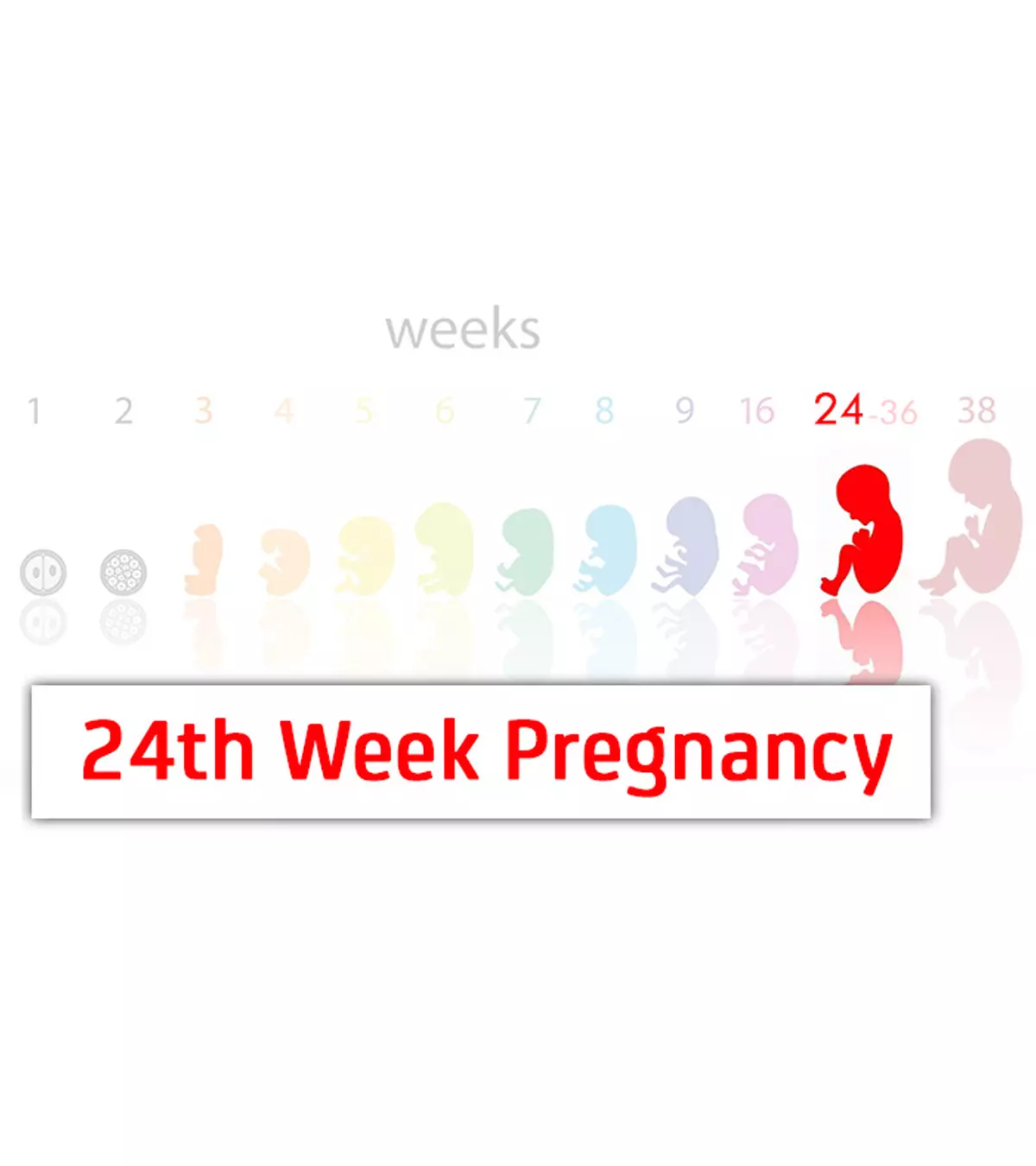
Image: ShutterStock

Key Pointers
- The baby measures 11.8in (30cm) and weighs around 1.32lb (600g), similar in size to an ear of corn.
- Organs such as the skin, head, eyes, lungs, brain, heart, fingers and toes, ear, bone marrows, tongue, and hair continue to develop.
- Symptoms may include Braxton-Hicks contractions, backache, constipation, swelling of feet, leg cramps, carpal tunnel syndrome, and pregnancy brain.
- Physical changes this week include a protruding belly, fuller and thicker hair, and enlarged breasts with darker areola and nipples.
How Many Months Pregnant Are You In The 24th week?
At 24 weeks, you are in the 7th month and second trimester of pregnancy. Your baby becomes viable during this week.
How Big Is Your Baby At 24 Weeks?
This week, your baby is as big as the ear of corn (1). The baby measures 11.8in (30cm) in length and weighs around 1.32lb (600g) (2).
Baby Development At 24 weeks
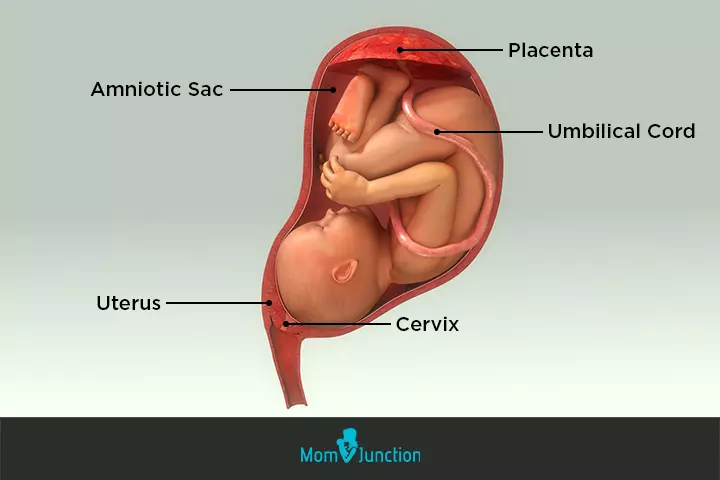
The baby’s weight starts increasing during this week, and the development continues at a faster pace. An ultrasound of your baby can update you on your baby’s physical development.
| Baby’s organs | Development |
|---|---|
| Skin (3) | Appears red and wrinkled. Fat deposition starts beneath the skin (4). |
| Head | Proportionally larger than the body. |
| Eyes (5) | Eyelids are separated into upper and lower lids. Eyelashes and eyebrows are visible. Eyes can open and close. |
| Lanugo | Skin is covered with fine hair and a waxy coating called vernix. |
| Lungs | Are developing. Baby starts breathing movements. Lung cells begin to form surfactants at this week (6) |
| Brain | Is developing and uses more than 50% of the fetus’ energy. There is around 400 to 500 percent increase in the brain weight. |
| Heart | More than 30 million heartbeats have occurred by this week (7). |
| Fingers and toes (8) | Developed and have unique finger and toe prints. |
| Ear (9) | Ear bones harden and make sound conduction possible. |
| Bone marrows (4) | Starts producing red blood cells. |
| Tongue | Taste buds are formed. |
| Hair | Begins to grow on the baby’s head. |
| Gender | In boys, testicles begin to grow into the scrotum, through the abdomen. In girls, the uterus is formed with ovaries containing eggs. |
| Reflexes | Baby develops the startle reflex. |
Fetal position and movements: At 24 weeks of pregnancy, the baby makes random moves as there is enough space inside the uterus. Thus, the baby may achieve any position this week. You can feel the wriggling and rolling movements (10). The baby also attains a regular sleep pattern this week.
What Symptoms Of Pregnancy Do You Experience In The 24th Week?
The symptoms you may experience this week include:
- Weight gain: An average pregnancy weight gain of one to two pounds per week during the second trimester is considered safe, as recommended by the American Pregnancy Association (APA) (11). However, in case of women with BMI less than 18.5 and greater than 24.9, the recommended weight gain rates usually range between 0.5 and one pound.
| BMI | Below 18.5 | 18.5 – 24.9 | 25 – 29.9 | 30 and Above |
|---|---|---|---|---|
| Weight gain (Pounds) | 13-21 | 11-18 | 7-14 | 5-11 |
- Braxton-Hicks contractions (12) are irregular and less painful contractions that you experience this week. It may be felt by some may not by others/li>
- The pressure exerted by the baby on the lower back also strains the muscles causing a backache.
- The digestion process slows down as the digestive tract relaxes due to the progesterone hormone, leading to constipation.
- The water retention in the body causes swelling up of the feet and ankle. In case of sudden swelling, go to the doctor as it could be a sign of preeclampsia.
- It is common to experience leg cramps this week, especially at night. Cramps could also be due to calcium deficiency or dehydration during pregnancy.
- The pregnancy changes can cause increased fatigue and sleep disturbances.
- To neutralize the acidity inside the mouth, excess saliva is secreted from the mouth.
- Risk of carpal tunnel syndrome in pregnancy due to an increase in the blood volume that puts extra pressure on the nerves, resulting in tingling feeling in the wrist and hands (13)
- Pregnancy hormones can alter the tear production causing itchy eyes.
- An increased buildup of fluid in the eyes can cause blurred vision.
- As the uterus is growing, the muscles and ligaments in the pelvic area stretch, causing lower abdominal ache.
- An increased vaginal discharge prevents uterine infections by restricting any bacteria from entering the vagina.
- The hormonal fluctuations can lead to ‘pregnancy brain’ or forgetfulness during this period (14).
- As the mucus membranes open up due to the hormonal fluctuations, there is more mucus flow through the nasal membranes that causes nasal congestion.

- The extra pressure put by the uterus on the bladders increases the frequency of urination.
 Quick fact
Quick factChanges In The Body At 24th Week
You experience several physical and emotional changes this week.
Physical changes

- A protruding belly
- Enlarged breasts with darker areola and nipples (15) You can see pimple-like spots, called Montgomery’s Tubercles, around the areola. These spots secrete lubricants that keep the nipples nourished and supple. Sometimes, there might be hair growth around the nipple or tissue growth.
- Stretch marks and itchy skin
- Darker linea nigra due to pregnancy hormones (16)
- White milky discharge from the breast, called colostrum.
- Blue or green veins visible on breasts, due to increased blood flow.
- Shinier, fuller, and thicker hair due to hormonal fluctuations.
- Darkening of skin, acne, and black patches around the neck due to hormonal changes.
Nikita, a new mother, shares her experience of being 24 weeks pregnant. Other than the common symptoms mentioned above, she shares some more. She writes, “I have been vomiting all over again. Yesterday morning, I think I brought that on by having milk in the mornings…Milk, cheese, chocolate, ice cream all those things are really setting me off. I get this bad taste left in my mouth that feels like it’s coming from my stomach…I have been getting a lot of pains in my back, and it just aching (i).”
Emotional changes
- Mood swings
- Anxiety
- Stress
- Forgetfulness
- Fatigue
Sharing about her emotional state at 24 weeks of pregnancy, Nikita writes, “I have been on this roller coaster of emotions… I seem to be easily crying for no real good reason and don’t cope well so much anymore with things… I just get frustrated more easily.”
When To Call The Doctor

Call your doctor right away, if you notice the following symptoms (12):
- Belly or pelvic pain
- Headache or fever
- Dizziness
- Headaches not subsiding after taking acetaminophen (Tylenol*)
- Uncontrolled nosebleeds
- Burning sensation or pain while you urinate
- Persistent leg cramps
 Did you know?
Did you know?Your OB/GYN Visit
Here is what you can expect during your OB/GYN visit:
Physical tests
- Weight check
- Blood pressure
- Fundal height measurement
Other tests
Glucose tolerance test is done to determine maternal blood sugar. It involves a one step or two step approach (10).
- One step (OGTT): Glucose levels are tested after a period of fasting, following which you will be given 75gm of glucose to drink. Your glucose levels are measured again one hour and two hours after the dose.
- Two-step: This begins with the glucose challenge test, where you are given 50gm of glucose to drink, and the blood sugar level is checked after 1 hour. If the test result is abnormal, then a three-hour glucose tolerance test is done. The glucose levels are measured after fasting and at 1 hour, 2 hours, and 3 hours after the dose. An abnormal test result is an indication of gestational diabetes.
According to a CDC National Center for Health Statistics report
, the incidence of gestational diabetes mellitus (GDM) among US women increased by 30% from 2016 to 2025. Women with gestational diabetes can work with healthcare providers to make dietary and lifestyle changes and, if necessary, receive medication and self-care tips based on test results.
The doctor will advise changes in your diet and lifestyle, and may even prescribe medication, based on the test results. You should continue taking care of yourself at home.
Tips For Mom-To-Be

Here are the tips to follow for a healthy pregnancy:
- Keep yourself hydrated by taking plenty of fluids.
- Avoid any stress or fears.
- Eat home cooked food.
- Pay special attention to your pregnancy nutrition. Go for a healthy diet including fish like Pollock, salmon, cod, shrimp, anchovies, and catfish. These are an excellent source of omega-3 fatty acids.
- Include fruits and vegetables, whole grain bread, bran, and breakfast cereals to the diet. Increase your intake of fiber-rich food to relieve constipation.
- Avoid smoking, alcohol consumption as well as an excess of caffeine intake.
- Get adequate sleep and take care of your sleeping positions.
- Take vitamins, iron, calcium, and folic acid supplements.
- Give your body enough rest.
- Maintain oral hygiene.
- Moderate exercises such as walking and kegel exercises help strengthen your pelvic muscles.
- Avoid lifting heavy objects.
- Wear loose, breathable clothes and comfortable footwear.
- Do not take any medicines without asking your doctor.
- Do not clean the cat litter to avoid toxoplasmosis.
- Avoid any exposure to toxic chemicals.
- Do not miss your antenatal appointments.
- Attend prenatal classes for childbirth education.
Tips For Dad-To-Be
Your partner can also help make this period comfortable for you. Here’s what he can do:
- Create a pleasant ambiance at home to ensure the emotional well-being of your wife.
- Accompany you to the hospital during prenatal visits.
- Help with household chores.
- Plan an outing for a change.
- Give a good neck and foot massage when you need it.
- Accompany you to your workout sessions.
Frequently Asked Questions
1. Are babies fully developed at 24 weeks?
Babies are not fully developed during the 24th week. The vital organs such as the lungs and brain are still developing at this stage. However, the baby might already start to appear like a newborn,
2. How often would the baby kick at 24 weeks?
The baby might kick between the 24th and 28th weeks of gestation. But, there is no set baby kick counts during pregnancy. Each baby follows a different pattern. You will eventually start to understand your baby’s pattern (11).
3. How long does the baby sleep in the womb at 24 weeks?
Around this week, a fetus starts to follow a sleeping pattern. Generally, a fetus sleeps in 20 to 40-minute cycles, sometimes extending to 90 minutes (11).
As the baby gradually takes up more space in the abdomen and slightly squeezes the lungs, it becomes common to feel short of breath now and then. Increased levels of the hormone progesterone may also be responsible for the same. However, it should not be accompanied by pain, wheezing, or coughing. At times, feeling short of breath may be a symptom of anemia. If you notice other common symptoms of anemia, such as tiredness, pale skin, and heart palpitations, accompanying it, you should consult your doctor (17) (18).
5. Can I get rashes at 24 weeks of pregnancy?
Rashes are common during pregnancy and may occur due to hormonal changes, triggering of a pre-existing skin condition, pregnancy-specific reactions, or viral infections. Pregnancy-specific rashes that may occur around 24 weeks of gestation include pruritic folliculitis of pregnancy (acne-line papules and pustules usually on the trunks, thighs, and arms), prurigo of pregnancy (red or brown itchy rashes), and pemphigoid gestationis (a rare autoimmune disease causing skin blisters) (19) (20).
The 24th week of pregnancy means you are in the seventh month of pregnancy and two months away from childbirth. Most of the baby’s organs are rapidly developing at this stage in pregnancy. As a result, you may be feeling a lot of movements of the baby. However, if you experience any contractions, you should consult your doctor. Nevertheless, these contractions are not always a cause for concern as they may also be Braxton Hicks contractions. Contact your healthcare provider if you notice any abnormal symptoms such as bleeding, unusual cramping, or reduced or abnormal fetal movement.
Infographic: Tips For Mom-To-Be
Being 24 weeks pregnant means that you are well into your second trimester and are likely starting to feel more like yourself again. This is an exciting time as you bond with your growing baby and prepare for its arrival. We bring tips to help you stay healthy during this stage of your pregnancy. Illustration: Momjunction Design Team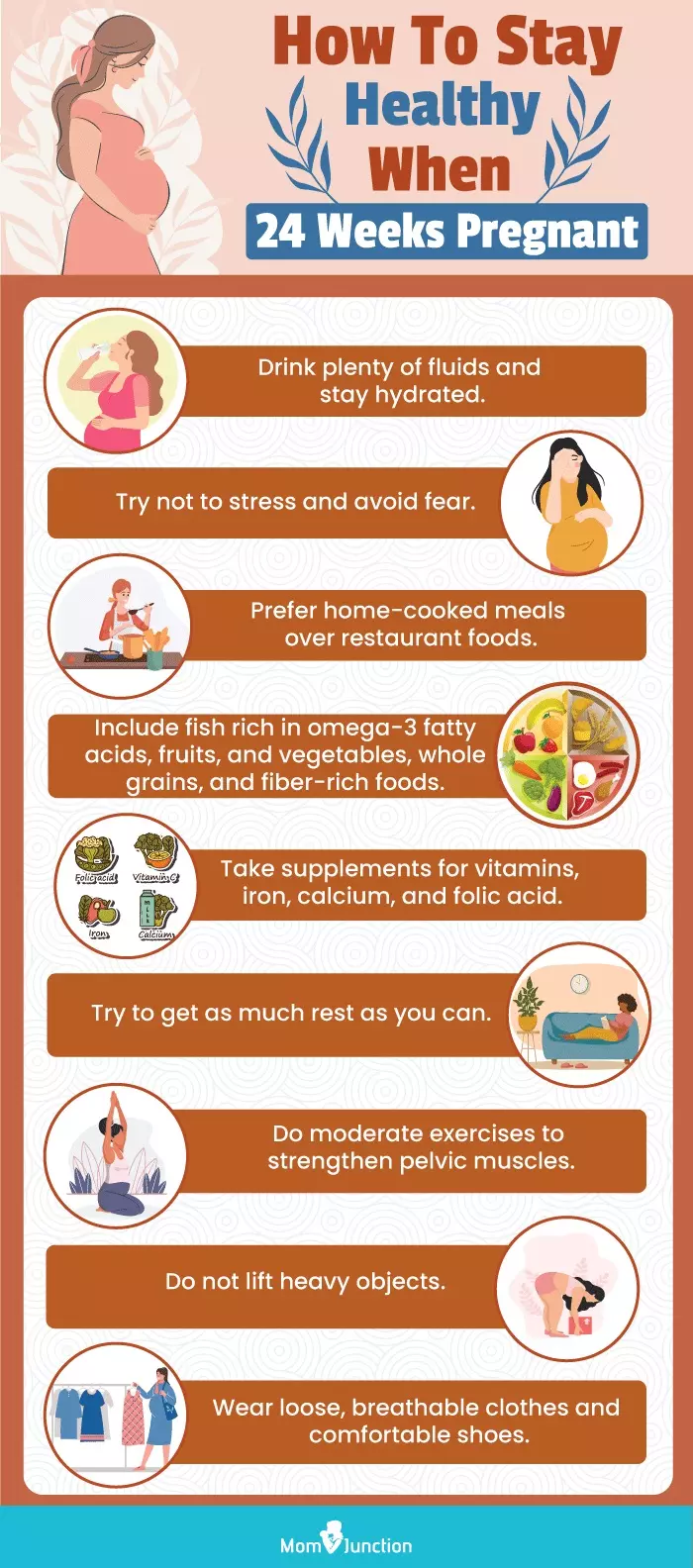
Illustration: 24th Week Pregnancy: Symptoms Baby Development And Tips
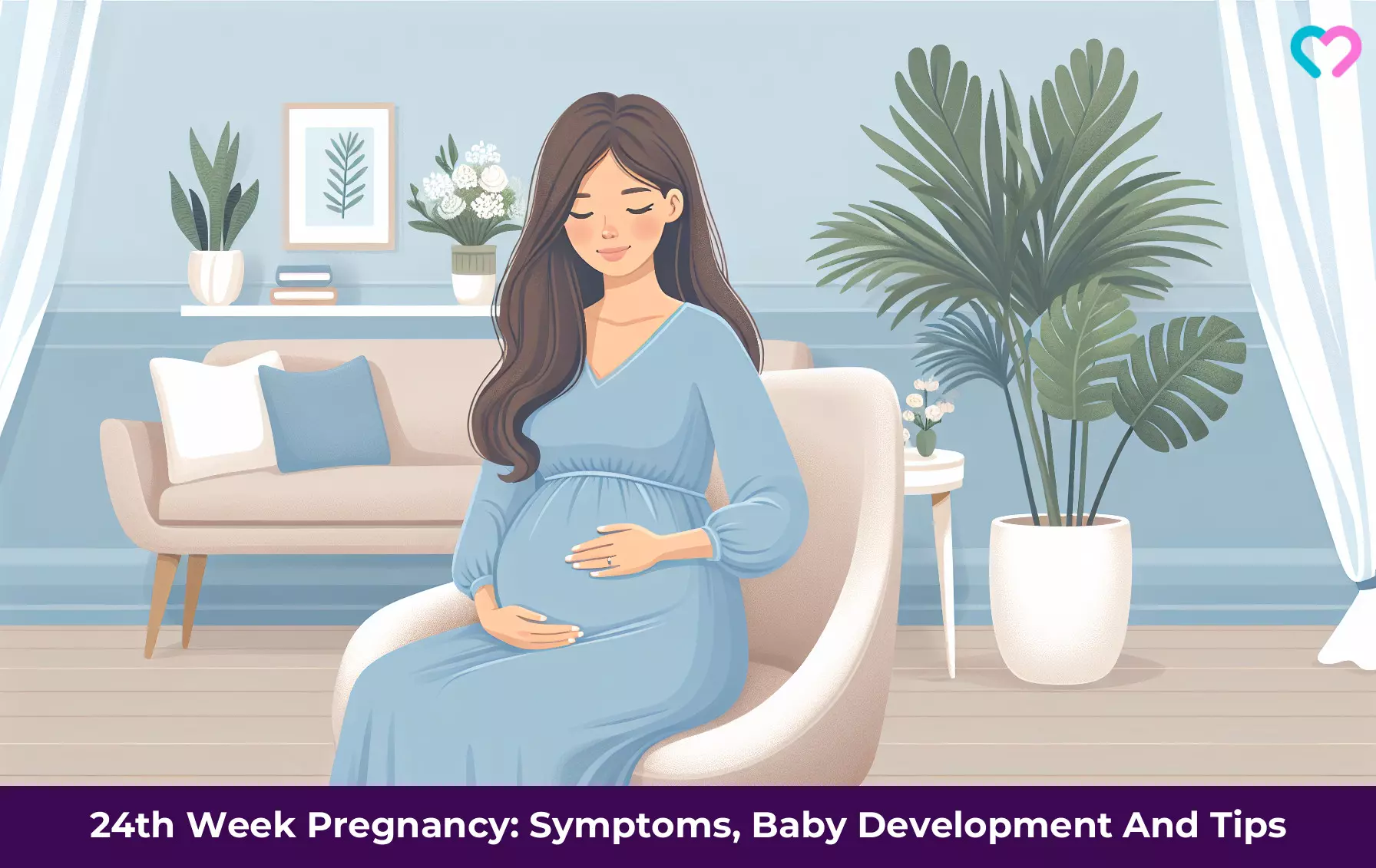
Image: Dall·E/MomJunction Design Team
Expect to feel more movement from your baby as they grow and develop. You may also experience increased fatigue and heartburn. In this video, detailed information is given on what to expect at 24 weeks of pregnancy.
Personal Experience: Source
MomJunction articles include first-hand experiences to provide you with better insights through real-life narratives. Here are the sources of personal accounts referenced in this article.
i. 24 weeks.https://njtreviews.blogspot.com/2013/05/24-weeks.html
References
- 24 weeks pregnant – all you need to know.
https://www.tommys.org/pregnancy-information/im-pregnant/pregnancy-week-by-week/24-weeks-pregnant - Fetal Development.
https://embryology.med.unsw.edu.au/embryology/index.php/Fetal_Development - Fetal Growth And Development.
https://doh.sd.gov/media/bnemplje/fetal.pdf - Stages of pregnancy.
https://womenshealth.gov/pregnancy/youre-pregnant-now-what/stages-pregnancy - Pregnancy – week by week.
https://www.betterhealth.vic.gov.au/health/healthyliving/pregnancy-week-by-week - Prenatal Form and Function – The Making of an Earth Suit.
https://www.ehd.org/dev_article_unit16.php - Prenatal Summary.
https://www.ehd.org/prenatal-summary.php - Fetal Development: Week 24.
https://www.michigan.gov/mdhhs/adult-child-serv/informedconsent/michigans-informed-consent-for-abortion-law/procedures/fetaldevelopment/fetal-development-week-24 - Hearing in the Womb.
https://lozierinstitute.org/dive-deeper/hearing-in-the-womb/ - Maternal Serum Screening, Second Trimester.
https://www.testing.com/tests/maternal-serum-screening-second-trimester/ - Weight Gain During Pregnancy.
https://babyyourbaby.org/pregnancy/during-pregnancy/weight-gain/ - Braxton Hicks Contractions
https://americanpregnancy.org/healthy-pregnancy/labor-and-birth/braxton-hicks/ - Carpal tunnel syndrome and pregnancy
https://www.pregnancybirthbaby.org.au/carpal-tunnel-syndrome-and-pregnancy#:~:text=How%20does%20pregnancy%20affect%20carpal,in%20your%20wrist%20and%20hand - Is ‘pregnancy brain’ real or just a myth?
https://utswmed.org/medblog/pregnancy-brain/ - Your breasts, your health throughout your life
https://www.nhs.uk/livewell/cancer/documents/ybyh_throughout_2011.pdf - Linea Nigra: Pregnancy Line
https://americanpregnancy.org/healthy-pregnancy/pregnancy-concerns/pregnancy-line-linea-nigra/ - 23 weeks pregnant: baby’s development, feeling breathless and telling your employer.
https://www.tommys.org/pregnancy-information/im-pregnant/pregnancy-week-by-week/23-weeks-pregnant - Shortness of Breath In Pregnancy.
https://www.health.harvard.edu/decision_guide/shortness-of-breath-in-pregnancy# - Rashes & Skin Conditions in Pregnancy.
https://secure.library.leicestershospitals.nhs.uk/PAGL/Shared%20Documents/Rashes%20and%20Skin%20Conditions%20in%20Pregnancy%20UHL%20Obstetric%20Guideline.pdf - Isabella Smith; (2018); Rashes in pregnancy.
https://journals.sagepub.com/doi/10.1177/1755738018759372?icid=int.sj-abstract.similar-articles.4 - Week-by-week guide to pregnancy
https://www.nhs.uk/start-for-life/pregnancy/week-by-week-guide-to-pregnancy/2nd-trimester/week-24/ - Pregnancy at week 24
https://www.pregnancybirthbaby.org.au/pregnancy-at-week-24
Community Experiences
Join the conversation and become a part of our nurturing community! Share your stories, experiences, and insights to connect with fellow parents.
Read full bio of Dr. Jayashree Jayakrishnan
Read full bio of Sakshi Mishra
Read full bio of Rebecca Malachi
Read full bio of Aneesha Amonz







